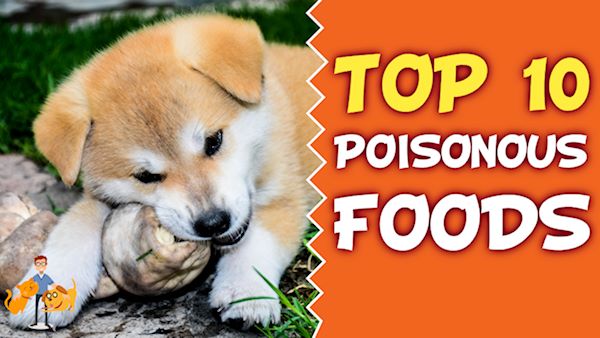10 things that can kill your dog
Dogs are curious animals by nature and it is normal that sometimes they end up getting in trouble for their curiosity. They use your mouth to investigate everything in their power.
- This can cause them a lot of problems when they discover something harmful to their health.
- Especially if we haven’t properly prevented it.
To help you prevent accidents with your dog, in Animal Expert we will present you with a list of, it is very important to keep this in mind as they can have disastrous consequences for your dog.
Although chocolate is a gift to humans, it’s not a good idea to give your dog chocolate. At Animal Expert, we explained above why dogs cannot eat chocolate, because chocolate contains a toxic substance for them, called theobromine.
Theobromine is an alkaloid obtained from the cocoa plant that stimulates the central nervous system, causes bronchodilation and has several cardiovascular effects. Dogs cannot easily eliminate theobromine and, as a result, becomes a toxic agent for them. It is estimated that only six grams per pound of weight of the dog can be fatal.
O de maior preocupação é o chocolate preto, porque contém 10 vezes mais teobromina que o chocolate de leite. Os sinais de envenenamento canino por chocolate incluem: aumento da atividade geral, diarreia, vômitos, incontinência urinária, aumento do ritmo cardíaco, aumento da frequência respiratória, tremores e espasmos. Por isso, nada de chocolate para o seu cachorro.
A good substitute for chocolate is carogar, a food that they are able to synthesize properly.
Who hasn’t taken acetaminophen once in a lifetime? Acetaminophen is an excellent painkiller that eliminates headaches and other ailments from modern life. However, this drug is a poison for dogs.
It is one of the banned human drugs for dogs, and acetaminophen poisoning in dogs occurs because the painkiller damages the liver and red blood cells. As a result, a dog poisoned by acetaminophen may die of liver necrosis.
It is estimated that 150 milligrams of acetaminophen per pound of dog is the lethal dose. This means that two acetaminophen pills can kill your puppy. So don’t give your dog acetaminophen, even if his head hurts!
Common alkalis in households are bleach, potassium permanganate and ammonium hydroxide. These substances are found in pipe uncovering liquids, bath detergents, ammonia and dishwasher detergents. They are also present in alkaline batteries, including clock batteries (button type).
If a dog swallows any of these things, it will have irritations and burns to the mucous membranes of the digestive tract: mouth, esophagus, stomach, intestine and colon. This damage is usually fatal.
Symptoms of alkaline poisoning include irritation of the oral mucosa, chest pain, seizures, drooling, lack of appetite and laziness. Death usually occurs within 24 hours of ingestion. You have to be very careful and not leave these things within reach of your puppy.
Mothballs are extremely dangerous when ingested by us or our pet. Naphthaline poisoning damages dogs’ livers and affects the central nervous system. Symptoms include vomiting and seizures. Be very careful where you place these balls and, if possible, do not use them.
Although detergents can be toxic if your dog swallows them, textile softeners are extremely toxic and can cause death. Textile softeners contain cationic detergents, which are also found in disinfectants and germicides.
Symptoms of poisoning with these substances include: hypersalivation (bave), lethargy, vomiting, burns in the mouth, seizures, shock and coma.
Some mouthwashes contain boric acid, which is very toxic to dogs. Other common elements in the home that contain boric acid are cleaning solutions for contact lenses and solutions for cleaning dentures.
Symptoms a dog poisoned with boric acid may have include vomiting, drooling, seizures and coma.
Antifreeze is one of the biggest risks for pets. Puppies die every year from antifreeze poisoning.
Many dogs end up dying of antifreeze because these substances have a pleasant smell and taste for dogs. Therefore, it is common for dogs to decide to taste this liquid that smells so good.
The toxic component of antifreeze is ethylene glycol, which affects kidney function and causes symptoms such as seizures, vomiting and lethargy.
Clothing bleaching agents and chlorine-containing compounds are highly toxic to dogs. Symptoms are vomiting, drooling and abdominal pain. Never leave these substances within reach of your puppy.
Many pieces or seeds of fruit are toxic to dogs. Some parts are so large that they can clog the airways, but others are simply toxic.
Two of the most toxic pieces for dogs are peach and apricot
Dogs, although more omnivorous than carnivores, have not evolved to feed on seeds. Therefore, your digestive system cannot adequately treat these elements. The result can be disastrous, so keep your puppy from eating seeds or fruit cores.
Find other plant-based foods that may be harmful to your pet on our list of prohibited fruits and vegetables for dogs.
Like fruit seeds, many ornamental plants are toxic to dogs and other animals. Although dogs tend to eat grass, apparently to improve digestion when they lack fiber in their diet, they are not able to tolerate all vegetables.
Symptoms of plant poisoning may vary by ingested species, but usually include vomiting and effects on the central nervous system.
Some plants toxic to dogs are: tomato, spinach, azalea, autumn saffron, avocado (leaves), laurel rose, deeda, morelle, belladonna, digital, hemlock, aquatic hemlock, ricin and canker sores. There are still other plants that are toxic to dogs, so it is better to prune the garden.
If you would like to read articles similar to, we recommend that you visit our Curiosities section of the animal world.

